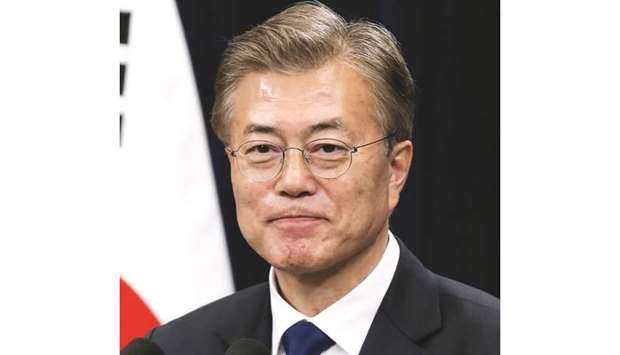South Korea’s president said yesterday he was “truly ashamed” of his government’s inability to clear air pollution that has blanketed Seoul and parts of the country for weeks, and proposed an early warning system with China. South Korea often accuses China of causing much of its air pollution, but China says it is not entirely to blame and South Korea should take more responsibility for its own air quality.
“The people had to suffer greatly last week due to an unprecedented number of days of dense fine dust,” President Moon Jae-in told a cabinet meeting yesterday. “I feel truly ashamed because we are unable to clearly address the issue.”
South Korea, Asia’s fourth largest economy, has been grappling with worsening air quality. Last year the government shut down five ageing coal-fired power plants from March to June in a bid to reduce air pollution. Moon called for further measures yesterday, including reducing the number of diesel cars on the roads, and modernising household heaters.
Moon said regional air pollution is a “disaster” that must be resolved through “creative” efforts and co-operation between governments.
“We know that there is a great deal of public concern because of the fine dust coming from China, and because China is also suffering from fine dust, it is necessary to strengthen co-operation to drastically reduce fine dust,” Moon said.
A senior Chinese official acknowledged pollution was a “regional problem” but that South Korea should do more to solve its own problems in large cities like Seoul. While air quality in key regions of China has improved by more than 40% since 2013, concentrations of tiny PM2.5 particles in Seoul were steady or rose slightly, said Liu Bingjiang of China’s atmospheric pollution department of the Ministry of Ecology and Environment. “The experiences of many countries shows that in the process of treating atmospheric pollution in a region, the local emissions treatment of large cities is more important,” Liu said at a monthly briefing. “If we blame transmission effects and do not face up to our own problems, we will not grasp those problems and miss the best chance to solve air pollution,” he added.
Liu said China was in close co-operation with regional neighbours like South Korea and Japan, and more studies were needed to determine the interaction of pollution between cities.
A joint study conducted by the US space agency Nasa and South Korea’s National Institute of Environmental Research in 2016 found that about 52% of South Korea’s pollutants originated within the country, while 48% came from other countries, including 34% from China.
Chinese and South Korean officials met in Seoul as part of ongoing working-level talks on the pollution problem.
An official from South Korea’s environment ministry said a joint study by South Korea, Japan and China will be released in November.

President Moon Jae-in
